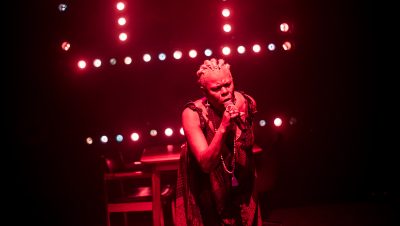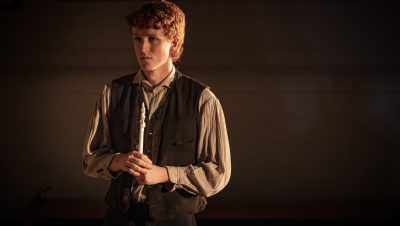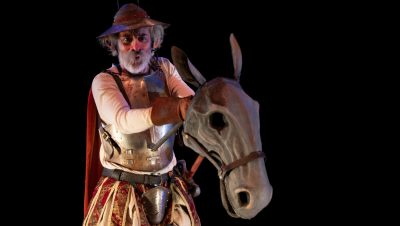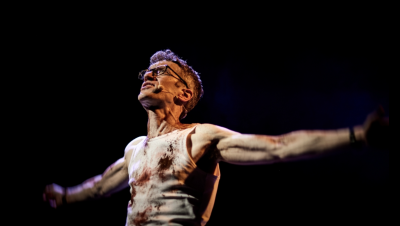
Theatre / Reviews
Dance Nation, Tobacco Factory Theatres – ‘An impressively acted piece’
Dance Nation is a production from Bristol DramSoc -the University of Bristol Drama Society. By Clare Barron, it premiered off-Broadway in 2018, and was nominated for the 2019 Pulitzer Prize for Drama, winning the Drama Desk Ensemble Award that same year. It follows a dance troupe of 13-year-olds – played by adults – as they prepare for their biggest competition yet.
We start with a dance number set to Someone In The Crowd, from La La Land, and the ensemble do an excellent job of conveying the youthful earnestness and undercurrent of chaos of young teenagers performing. The large contingent of friends and family in the crowd add to the sense of high stakes, whooping at every turn and jump.
Then, one of the dancers falls, struggling to get up as her flustered friends continue around her. The number concludes and we’re onto the narrative as the play gets underway. The girls – one now limping – are shepherded in their quest for victory by the camp, ruthlessly dramatic Dance Teacher Pat, played by Leo Hincks. As a recovering fan of Dance Moms (the seminal Lifetime reality show following dance teacher Abby Lee and the mothers and daughters of the Abby Lee dance company in Pittsburgh), the role of the overbearing dance teacher who holds the destiny and self-esteem of their pupils in her hands is a rich one, fraught as it is with complicated power dynamics and potential for cruelty.
is needed now More than ever
Unfortunately, despite Hincks’ commitment, the role is rather one-note, rarely spilling over into anything other than entertainingly snippy (on being accused by her mother of ‘purposely intimidating’ one of the girls, he responds ‘That’s my job’), although his Act II pep talk about the team’s power to lift up those who are less fortunate through dance is very funny.
The initial conflict of the play comes as the girls are competing to play the role of Gandhi in the upcoming competition number. Star of the troupe Aminah (Maddi Jabir) is hopeful, but it’s won by the more retiring Connie (Biba Dar). It’s a hollow victory though, as Pat has created a more prominent Spirit of Gandhi role to be played by focused Zuzu (Isabella Thathapudi). It feels like the racial dynamics at play aren’t really addressed – much like the infamous Rosa Parks number in Dance Moms, the dynamics within such a competitive environment when it comes to casting people who are the race of the character they’re playing feels worth investigating.
Characters have various duologues and asides to the audience in which they fill us in on their backstories and motivations, reminiscent of A Chorus Line. Unfortunately, despite the talent of the actors, they aren’t always complex enough to make it worth it.
View this post on Instagram
The single male troupe member, Luke (a sweetly bashful Cameron Lawrence) whose position is intrinsically interesting, does get a short scene with his mother outside of the studio, but his unique position as the only male and therefore default pin-up isn’t really explored.
Aminah, whose position within the group is also intriguing, doesn’t get one until close to the end, which feels too late in proceedings. Ashlee (Lily Robinson) gets one of the most longest and most emotionally complex monologues, and it’s a stellar display of Robinson’s charisma, even if it is oddly absent of any indication of the character’s internal struggles, revealed later.
As Act II gets underway, the stakes have risen even higher as the troupe progress through the rounds of the competition. The ensemble capture brilliantly the hysteria of backstage, and overall are excellent at creating the physicality and playfulness of 13-year-olds, especially Maeve (Rosa Melvin). Their dialogue feels naturalistic and unforced. Usually, the roles are played by older adults, and a cast of young students has a different effect, but still adds an interesting complexity.
Dance Teacher Pat is oddly less present in the second half until almost the end, which feels like a confusing choice given the situation; it would have been interesting to see some scenes of him critiquing the dancers as the pressure on them grows. A few narrative threads are left unresolved, and as such the ending feels a little sudden.
Overall, the play could have taken more advantage of the dramatic opportunities the premise offered, such as how the dancers’ changing bodies effect their performances and prospects, the impact of being a dance teacher’s favourite and therefore being resented by your peers, or the extent to which dreams that are reliant on one’s physical form are innately unstable. However, it’s an impressively acted piece, with distinctive characterisation and vulnerability, and it will be exciting to see what the cast do next.
Dance Nation is at Tobacco Factory Theatres on May 24-25 at 7pm. Tickets are available at www.tobaccofactorytheatres.com.
Main photo: DramSoc
Read next:
 Our newsletters emailed directly to you
Our newsletters emailed directly to you



















